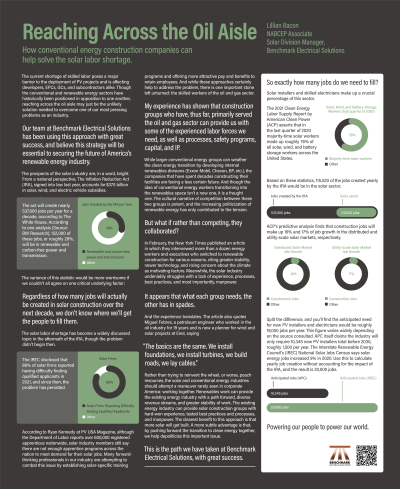Back

Managing Growth
Reaching across the oil aisle: How conventional energy construction companies can help solve the solar labor shortage.
Tuesday, September 12, 2023
4:30 PM - 5:30 PM PDT
Location: Poster Area, Booth #11024, Level 1, Venetian Expo Hall


Lillian Bacon, NABCEP Associate (she/her/hers)
Solar Division Manager
Benchmark Electrical Solutions
Windsor, Colorado, United States
Poster Presenter(s)
Description and Background: The current labor shortage poses a major bottleneck to the completion of PV projects and is felt by developers, EPCs, GCs, and subcontractors alike. This is predicted to be further exacerbated by the IRA’s labor requirements and the projected 40% increase in total solar deployment over the next 5 years (SEIA/WM).
Intelligent people in our industry are already establishing training programs and offering more attractive pay and benefits to retain employees, and while these approaches will certainly help address the problem, I think we have left one important stone unturned. Reaching across the oil aisle just may be the unlikely solution to one of our most pressing problems as an industry.
I speak from experience when I say that construction groups who have, thus far, primarily served the oil and gas sector can provide us with some of the experienced labor forces we need. In fact, they can also provide processes, safety programs, capital, and IP.
While larger O&G groups can weather the clean energy transition by developing internal renewables divisions, the companies that have spent decades constructing their facilities are facing a less certain future. It makes sense for them to diversify revenue streams by exploring new areas in which they can put their skills to work, and the needs of these groups and the groups struggling to build solar in America right now compliment each other in a surprising number of ways.
-Both require competency in land management, engineering, procurement, project management, and skilled trades.
-O&G construction groups are highly familiar with the main components of solar systems: pipe, wire, piles, and panels.
-O&G construction work tends to drop off in fall and winter, peak seasons for the solar industry.
-O&G construction groups are required to have robust safety programs which can easily transfer to solar.
-And, most importantly, O&G construction groups employ and support the education of large numbers of skilled tradespeople.
The cultural narrative of competition between conventional and renewable energy has sent these groups the message that “renewables are coming for your job.” I propose methods of pursuing collaboration over competition to changing that message to “renewables are coming to bring you jobs.” The clearest benefit to this approach is that more solar will get built. A more subtle advantage is that, by pushing forward the transition to clean energy together, we help depoliticize this important issue.
Intelligent people in our industry are already establishing training programs and offering more attractive pay and benefits to retain employees, and while these approaches will certainly help address the problem, I think we have left one important stone unturned. Reaching across the oil aisle just may be the unlikely solution to one of our most pressing problems as an industry.
I speak from experience when I say that construction groups who have, thus far, primarily served the oil and gas sector can provide us with some of the experienced labor forces we need. In fact, they can also provide processes, safety programs, capital, and IP.
While larger O&G groups can weather the clean energy transition by developing internal renewables divisions, the companies that have spent decades constructing their facilities are facing a less certain future. It makes sense for them to diversify revenue streams by exploring new areas in which they can put their skills to work, and the needs of these groups and the groups struggling to build solar in America right now compliment each other in a surprising number of ways.
-Both require competency in land management, engineering, procurement, project management, and skilled trades.
-O&G construction groups are highly familiar with the main components of solar systems: pipe, wire, piles, and panels.
-O&G construction work tends to drop off in fall and winter, peak seasons for the solar industry.
-O&G construction groups are required to have robust safety programs which can easily transfer to solar.
-And, most importantly, O&G construction groups employ and support the education of large numbers of skilled tradespeople.
The cultural narrative of competition between conventional and renewable energy has sent these groups the message that “renewables are coming for your job.” I propose methods of pursuing collaboration over competition to changing that message to “renewables are coming to bring you jobs.” The clearest benefit to this approach is that more solar will get built. A more subtle advantage is that, by pushing forward the transition to clean energy together, we help depoliticize this important issue.
